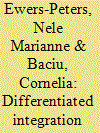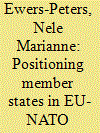|
|
|
Sort Order |
|
|
|
Items / Page
|
|
|
|
|
|
|
| Srl | Item |
| 1 |
ID:
187306


|
|
|
|
|
| Summary/Abstract |
An extensive size of literature has investigated the multifaceted dimensions of differentiated integration in Europe. Notwithstanding, we know little about the drivers and strategic underpinnings of differentiated integration in the high politics areas concerning national and international security, such as foreign policy, security and defence. What explains the variation in states’ foreign policy preferences of integration in multilateral security orders? In this article, we seek to explain this variation by putting forward a two-level argument. First, we claim that states adopt a genuine role player conception underpinned by a mixture of relative gains, absolute gains, and normative factors. Second, we propose a novel operational model to examine member states’ efforts for cooperation and integration in the security and defence domain based on their threat perceptions, level of ambitions, strategic partnerships, military spending, and troop deployments. To illustrate our argument, we employ a comparative case study design, examining four countries: Germany, France, Ireland and Romania. The article finds that the analysed countries play conspicuous roles in the Euro-Atlantic security order. France takes the role of an agile power-projector, Germany embraces the role of a global responsibility taker, Ireland plays the role of a peacekeeping neutral, and Romania of a small regional power.
|
|
|
|
|
|
|
|
|
|
|
|
|
|
|
|
| 2 |
ID:
190057


|
|
|
|
|
| Summary/Abstract |
With the growing density and the plethora of security organisations on the regional and international level, the research programme on interorganisational relations has received increasing scholarly attention. The complexity of European security – in light of the Ukraine conflict since 2014, Russia’s more assertive foreign policy behaviour, and on-going crisis management operations in the Africa, the Mediterranean Sea and Middle East – has revived EU-NATO cooperation. The analysis from the perspective of member states and how they can be positioned in the EU-NATO interorganisational relations, however, has received little exploration. This article, therefore, addresses the roles and positions of member states within the relations between the EU and NATO as Europe’s prime security organisations. Member states have numerous political strategies at their disposal to trigger, strengthen or obstruct interorganisational relations, ranging from forum-shopping to hostage-taking and brokering. Drawing on insights from regime theory, network analysis, organisation theory and interorganisationalism, this article proposes a typology of member states in EU-NATO cooperation. Against the backdrop of this special relationship, the typology is developed which aims to detect and illustrate member states’ positions and strategies.
|
|
|
|
|
|
|
|
|
|
|
|
|
|
|
|
|
|
|
|
|